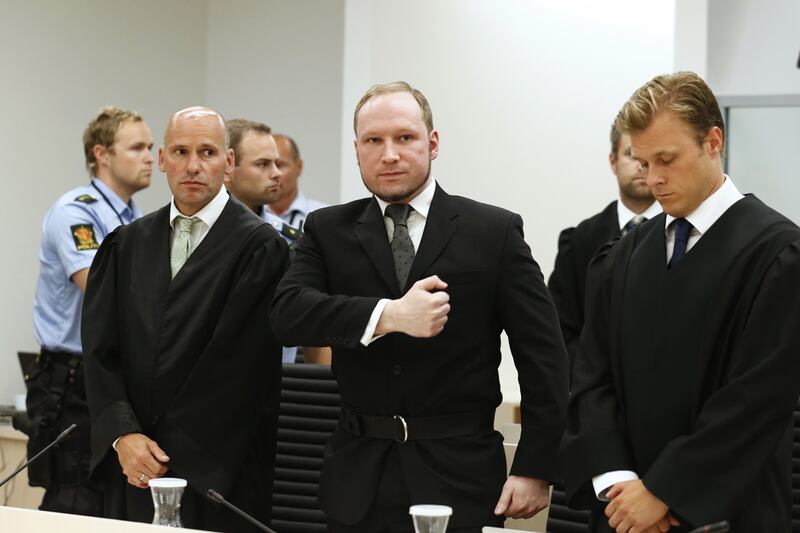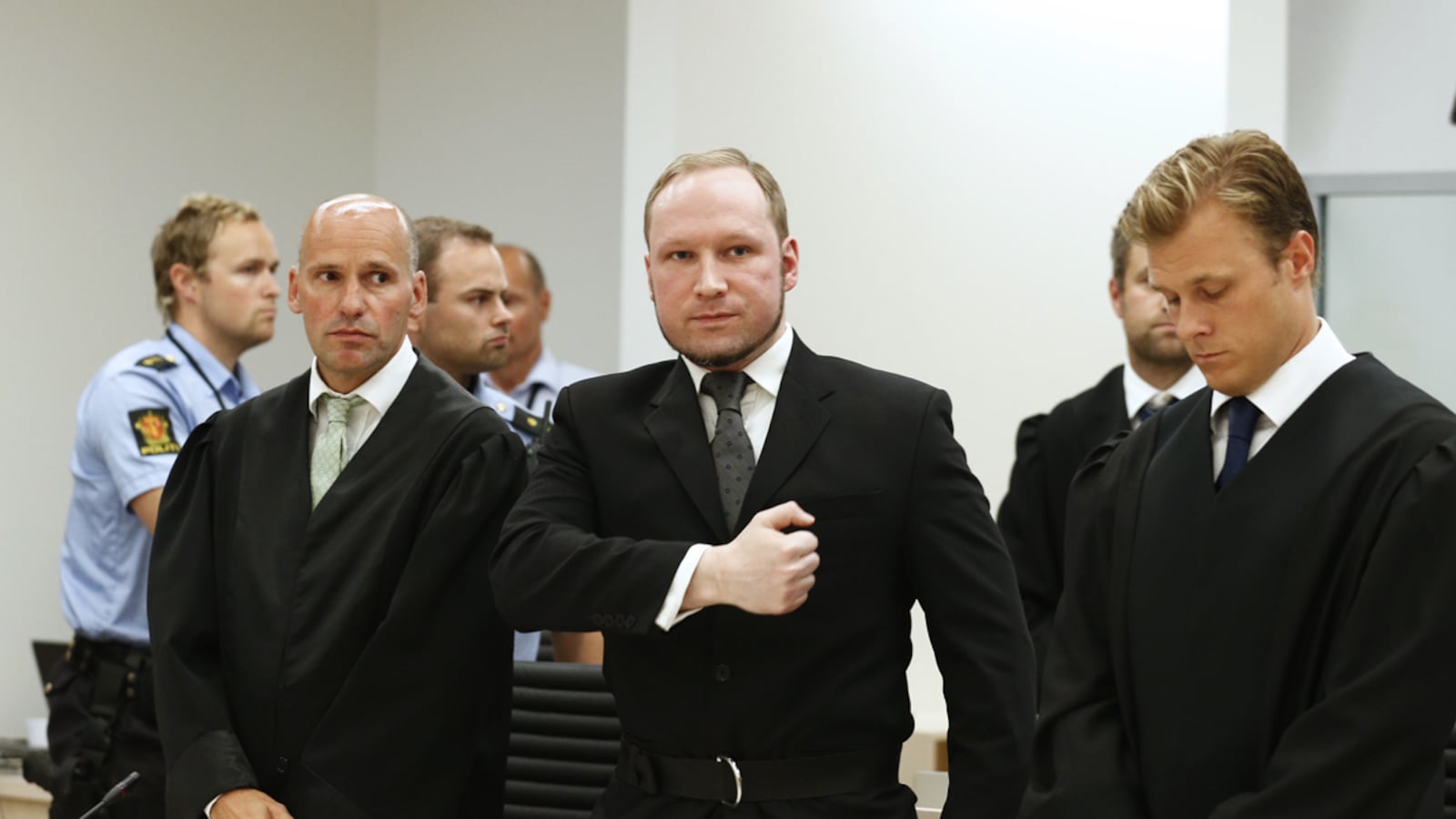“Brave” was the word mostly heard in the corridors of an Oslo court on Friday as Anders Behring Breivik was declared sane and sentenced to a 21-year term in prison.
The word was reserved for Wenche Arntzen, the judge who read out the verdict during the seven-hour session. She went against the state prosecutor and his team, who saw Breivik as sick and psychotic based on the report of a pair of forensic psychiatrists.
In the past few months, a debate has raged about the great power that court psychiatrists hold in Norway, where it is considered a greater crime to send a sick person to prison than to treat a sane person. Only a shade of evidence has been needed to judge a person insane, freeing them from criminal responsibility. The closure of Breivik’s case might be a new beginning for the Norwegian court system, where justice as understood by most people might hold sway rather than justice according to psychiatrists.
A sigh of relief was exhaled in the tightly packed courtroom as the verdict was pronounced—the longest possible sentence under Norwegian law.
The sigh came both from Anders Behring Breivik and from his victims. Paradoxically enough, both sides hoped for the same result—that he be found sane and therefore accountable for his crimes. No one but the prosecutors wanted him to be sent to a psychiatric ward for treatment.
Most Norwegians, impeccably liberal ones at that, have at times been angered by the soft way that Breivik has been treated by authorities, by the way he has been allowed to communicate with such ease to the outside world.
For most of the survivors, and the friends and families of the 77 people he murdered, it mattered that Breivik got a prison sentence. He planned his crimes, he executed his murders—and now he will be put behind bars for what is likely to be much more than two decades. Because as long as he poses a risk to the society he will not be let out. Had he been judged insane, he would not in the eyes of the law have had to bear a burden of guilt; he would have been treated, not punished.

Of course, the court did not judge him to be mentally normal—merely not psychotic. The judges said he suffered from grandiose delusions and narcissism. Indeed, the reason why Breivik wanted to be regarded as sane flowed from his narcissistic personality disorder: he wants to be seen, admired, and hailed. He wants to be the world’s leading anti-Islamic ideologue. But who would follow, or at least look up to, a madman?
Breivik committed his crimes in order to get a stage to spread his ideology, as written in his European Declaration of Independence, a 1,500-page manifesto against multiculturalism. His stated goal was to become leader of the extreme right across Europe and to stop the conspiracy, run by the politicians and liberal media, to flood Europe with Muslims. In his eyes, the bombing of Oslo’s government headquarters and the shooting spree on the island of Utoya on July 22 last year were necessary acts to get attention. A trial would be the best stage for him, he wrote in his manifesto, to broadcast his thoughts to the world.
“Had the newspapers’ columns been open to me, I wouldn’t have had to kill all these people,” Breivik argued in court during the 10-week trial this spring. He has now definitely made it into the papers, and even if most far-right groups have criticized his cruel killing of bureaucrats and left-wing teenagers, he also won a few followers.
A letter from a movement calling themselves “Conservative Revolutionaries”—probably no more than a few individuals lurking in the darker chat rooms of the Internet—issued a statement calling Breivik “our commander” and expressing joy over the verdict: “This shows that some vestiges of justice still do exist in Europe, and thus they can’t silence a man by dismissing his views as the ramblings of a lunatic.”
But this call for “revolutionaries” to get to work “with keyboards and weapons” was drowned out by the sigh of relief that was tweeted and blogged by ordinary Norwegians. According to polls, a clear majority sees Breivik as criminally sane and thinks he should be punished for his crimes. But not only that. They also hope that this verdict, branding Breivik a criminal, will end his presence in the media. “Will you stop making headlines about him now?” a mother pleaded to me, referring to the Norwegian newspapers who over the past year have frequently had his face on their front pages. “Will we now finally be allowed to grieve at our own pace?” she asked.
Well, if Brevik gets his will, they won’t. For the 33-year-old man, the terrorist act has been a full-fledged success. A man who never completed high school, who never held down a job for more than a couple of years, who certainly never succeeded in getting the political career he wanted—this man managed to execute a very complex terror act. In order to do it, he stayed under the radar of the Norwegian police even as he bought guns, fertilizers, chemicals, and fuses on the Internet without anyone batting an eyelid.
And since he has been in custody, he has successfully built up his importance. He has manipulated the police to get his personal computer and printer. And he has used this to communicate extensively with fellow militant nationalists, as he calls them. His computer is offline, but he was able to post his letters to followers, and asks them to copy them on their blogs.
Now that he will be confined to his three cells—one bedroom, one “bureau,” and one fitness cell—of eight square meters each, the question is whether the prison will still allow him to spread his message, the true goal of his terror act. His lawyer argued that he would be so depressed if his computer was taken away from him. A peculiar choice of words considering the grief he has caused. Depressed?
The mothers and fathers in court have shown remarkable grace, not focusing on hatred, but on their grief and loss. But they should not be expected to mind one bit that Breivik might become a bit depressed in his cell. He should not be allowed to feel like a privileged political prisoner writing his books in prison. “If he wants to write, he should carve his writings with his fingers on a stone” a survivor wrote on his Facebook account.
The terrorist was supposed to get the final word in court this Friday, telling the judge whether he wanted to appeal or not. He answered he didn’t recognize a court that got its authority from a multicultural state, so he couldn’t appeal. “But, I would like to regret to all nationalists …” he continued, and was firmly stopped by judge Arntzen. “You are not allowed to make a statement,” she instructed, and only those sitting next to him heard the continuation: “… that I did not kill more people.”
He had to shut up. His microphone was muted. Finally—and at long last—silenced by the law.





